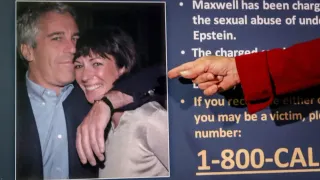January 1, 2020
Lawmakers Pledge ERA Will Pass in Virginia. Then What?
Sarah Rankin and David Crary READ TIME: 4 MIN.
Supporters of the Equal Rights Amendment are so confident Virginia is on the verge of becoming the critical 38th state to ratify the gender equality measure, they are already making plans for how they will celebrate.
But that jubilation could be largely symbolic. Despite broad support for the amendment in the state, the ERA's prospects nationally are substantially more complicated.
The proposed 28th amendment to the U.S. Constitution faces a host of likely legal challenges and vehement opposition from conservative activists who depict the ERA as a threat to their stances on abortion and transgender rights.
The passage of time is also a factor. When the measure passed Congress in 1972, lawmakers attached a 1977 ratification deadline to it, then extended it to 1982. While the Democrat-controlled House of Representatives is likely to extend the deadline again, the Republican-controlled Senate may balk, increasing the chances of litigation. Lawsuits also could be waged over an attempt by five states in the 1970s to rescind their initial support for the amendment.
At least one legal challenge is already underway. Alabama, Louisiana and South Dakota filed a lawsuit in federal court in mid-December seeking to prevent the U.S. archivist from accepting a new ratification.
In Virginia, the ERA's future is bright: Democrats who seized control of the state legislature in November say there is unanimous support in both their House and Senate caucuses.
"It will pass," Virginia House Speaker-elect Eileen Filler-Corn said pointedly at a recent news conference attended by cheering advocates, some of whom have been working on the issue for decades.
Virginia supporters have framed ERA ratification as a chance to rebut the state's long history of racist and intolerant policies.
In the past, Virginia "fought against desegregation ... fought against interracial marriage ... fought against women's right to vote," said Jennifer Carroll Foy, chief patron of the House ratification resolution who is also a member of the black caucus and one of the first women admitted to the historically all-male Virginia Military Institute. "And it is only poetic justice that now we stand on the right side of history and finally give women their full constitutional equality."
After a ratification vote, Virginia is expected to submit copies of the state's resolution to the U.S. archivist. State Attorney General Mark Herring said when that happens, he will include legal arguments in support of the ERA.
Herring, who personally supports the proposed amendment, said his office has been preparing for a long time for potential challenges to Virginia's ratification.
"If we have to go to court, I won't hesitate," he said.
Emily Martin, general counsel for the National Women's Law Center – which supports the ERA – is uncertain what lies ahead. But she hopes that a campaign for ERA ratification will kindle a new surge of women's activism comparable to the women's marches of 2016 and the subsequent emergence of the #MeToo movement.
"Mobilization around ensuring women's equality is really important at this moment when the Trump administration is going backward in so many ways that are harmful to women and girls," she said, referring to President Donald Trump.
Some of the ERA-related arguments surfacing now are similar to those that flared in the 1970s. Would ratification mean that women, as well as men, are subject to the military draft? Would it undermine workplace laws intended to protect women?
But some of the liveliest debate over the coming months will likely deal with two hot-button social issues that have evolved significantly since the '70s: abortion access and the rights of transgender people.
While abortion has been legal nationwide since the Supreme Court's Roe v. Wade ruling in 1973, many Republican-controlled states have passed tough anti-abortion laws in recent years and are hopeful the high court might repeal or weaken Roe.
Anti-abortion activists worry that the ERA, if ratified, would be used by abortion-rights supporters to quash abortion restrictions on grounds they specifically discriminate against women.
"That's the whole reason ERA has been brought back," said Anne Schlafly Cori of the conservative advocacy group Eagle Forum. "The proponents are concerned about Roe being stripped away by the Supreme Court, so they're trying to shoehorn the ERA into the Constitution."
"Any vote for the ERA is a vote for abortion," said Cori, whose mother, Eagle Forum founder Phyllis Schlafly, spearheaded a highly successful opposition movement to the amendment in the '70s.
Martin affirmed that abortion access is a key issue for many ERA supporters; she said adding the amendment to the constitution would enable courts to rule that restrictions on abortion "perpetuate gender inequality."
The issue of transgender rights was far from the spotlight in the 1970s, but is likely to be a divisive topic in the coming ERA debate. Some ERA opponents are trying to kindle alarm over the possibility that the amendment would be used to ensure nationwide protections for transgender women seeking to use women-only restrooms and locker rooms.
"The ERA would be used to impose the most radical consequences of the new 'gender revolution,' which allows men to declare themselves women and vice versa," said Penny Nance, CEO of Concerned Women for America, another conservative advocacy group.
Jennifer Boylan, a transgender writer who teaches at Barnard College in New York City, depicted such rhetoric as "the hysteria of right-wing scaremongers."
"The ERA won't take away anyone's rights; it will simply make the country a little fairer," she said.
Among the Virginia lawmakers who will soon vote on the ERA is Danica Roem, the first openly transgender person to be elected and seated in a state legislature.
"Equality for women is about equality for all women," she said. "LGBTQ women are women. And we're not going away."
___
Crary reported from New York.






